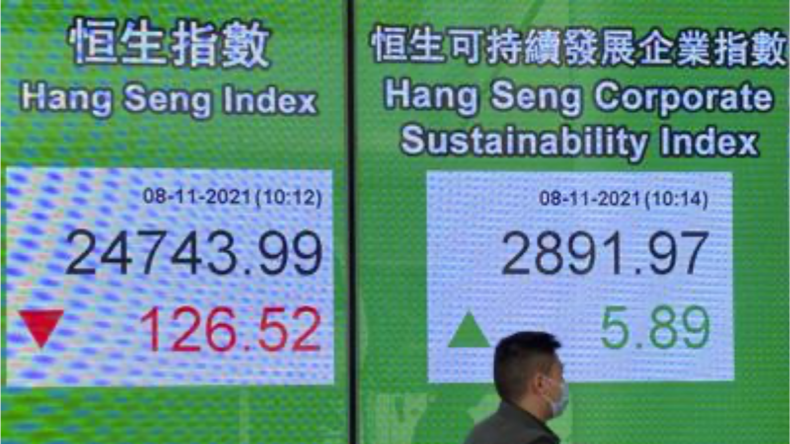Asian financial exchanges are for the most part, lower after Wall Street hit another high, and China revealed a twofold digit ascend in trades.
A man strolls past a bank’s electronic board showing the Hong Kong share record at the Hong Kong Stock Exchange, Monday, Nov. 8, 2021. (AP Photo/Vincent Yu)
Asian securities exchanges were generally lower after Wall Street hit another high, and China revealed a twofold digit ascend in trades. Tokyo, Hong Kong and Sydney declined while Shanghai progressed.
Money Street’s benchmark S&P 500 file rose 0.4% on Friday to a record for a seventh day after U.S. managers recruited a more significant number of individuals in October than anticipated.
China’s October sends out rose 27.1% longer than a year sooner. However, that dialled down the earlier month’s 28.1% development, and customs information showed Sunday.
Despite that increase, the Chinese enemy of infection controls may hose manufacturing plant and purchaser action, “actually achieving a questionable recuperation picture,” Yeap Jun Rong of IG said in a report.
The Nikkei 225 in Tokyo fell 0.3% to 29,528.45 while the Shanghai Composite Index shed 0.1% to 3,495.04. The Hang Seng in Hong Kong lost 0.6% to 24,728.63.
The Kospi in Seoul withdrew 0.7% to 2,948.39, and Sydney’s S&P-ASX 200 lost 0.2% to 7,445.50.
India’s Sensex opened down 0.3% at 59,903.04. New Zealand withdrew while Southeast Asia markets rose.
On Wall Street, the S&P 500 rose to 4,697.53 after the public authority revealed the U.S. economy added 531,000 positions last month, better than the agreement gauge of 450,000.
The Dow Jones Industrial Average acquired 0.6% to 36,327.95, likewise hitting another high. The Nasdaq composite added 0.2% to 15,971.59.
The U.S. government is because of report expansion this week. Financial backers are watching value ascends amid fears more grounded inflationary tensions may provoke the Federal Reserve and other national banks to pull back upgrade that is helping stock costs.
This week, China’s decision Communist Party holds its 6th full administration meeting of the most recent five-year political cycle that goes through 2022. The 6th plenum typically centres around philosophy and party issues rather than the economy.
Notwithstanding, financial backers likewise trust for potential reports on the approach toward innovation and different ventures after information security and hostile to restraining infrastructure crackdowns on Chinese tech goliaths that started before the end of last year cleared more than $1 trillion off their absolute securities exchange esteems.
Benchmark U.S. raw petroleum rose 99 pennies to $82.26 per barrel in electronic exchanging on the New York Mercantile Exchange in energy markets. The agreement acquired $2.46 to $81.27 on Friday.
Brent rough, the value reason for global oils, reached 90 pennies to $83.65 per barrel in London. The last meeting added $2.20 to $82.74. The dollar acquired to 113.58 yen from Friday’s 113.40 yen. The euro progressed to $1.1564 from $1.1550.
While during COVID 19
An eruption of information out of China showed organizations were wrestling with the effect of confined lockdowns following inconsistent COVID-19 episodes, supply bottlenecks and high natural substances costs.
Retail deals developed at the slowest pace since August 2020 and missed investigators assumptions, while current yield likewise rose at a more fragile speed from July, highlighting ongoing indications of loosening monetary energy in China and adding to beliefs Beijing will offer more improvement over coming months.
After the information, Chinese blue chips (CSI300) were down 0.73%. The Hong Kong (.HSI) benchmark shed 0.87% hauled somewhere near gambling club stocks as the gaming centre point of Macau starts a meeting in front of a firmly watched rebidding of its multi-billion-dollar gambling clubs one year from now.
Portions of Wynn Macau (1128. HK) at one point were down over 30%. Markets additionally stayed zeroed in on the course of events for tightening the Federal Reserve’s substantial pandemic-drove boost.
“There is a vulnerability in business sectors right now as financial backers stand by to perceive what the Federal Reserve will do about tightening their resource buys, which relies upon the condition of the work market and the swelling circumstance,” said Sean Debow, Asia CEO of Eurizon Asset Management.
Chinese market got back from break at the start of October.













